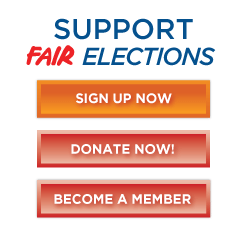About SB 42, California Fair Elections Act
Allow Public Funding of Campaigns So Elections Are Won, Not Bought!
The amount of money in politics is outrageous and is corrupting the system. This massive fundraising buys access for special interests, but shuts out the rest of us. We need to change the way we finance election campaigns so politicians can focus on the job we sent them to accomplish.
Five charter cities (Berkeley, Long Beach, Los Angeles, Oakland, and San Francisco) have public financing systems to amplify the voices of everyday voters and provide candidates with a viable alternative fundraising method not reliant on wealthy donors or special interests.
Unfortunately, such programs are prohibited in California jurisdictions other than charter cities. This ban must be repealed by the voters to allow counties, districts, general law cities, and the state to enact public financing laws if they chose to.
SB 42 would put the California Fair Elections Act on the November 2026 ballot to remove the current prohibition of public financing of campaigns while establishing basic requirements that public financing systems and candidates using public funding must follow to protect taxpayers and maximize the benefit to voters.
SB 42 is authored by Clean Money Champions Senators Tom Umberg and Ben Allen and Assemblymember Alex Lee. It is sponsored by the California Clean Money Campaign and cosponsored by California Common Cause and the League of Womeon Voters of California..
We must pass the California Fair Elections Act to let every jurisdiction in California make elections about ideas not money!

SB 42 Will Put a Measure on the Ballot to Allow Public Campaign Funding
- Places the California Fair Elections Act on the November 2026 ballot to allow public funding of campaigns in any city, county, district, and the state itself as long as the systems meet specific requirements.
- Requires that public funding candidates abide by expenditure limits.
- Requires that candidates must meet strict criteria to qualify such as requiring candidates receive small dollar contributions or vouchers from a specified number of adult residents.
- Prohibits the use of public funds to pay for legal defense or fines.
- Prohibits candidates receiving public funds from repaying personal loans with public funds, or repaying personal loans with private donations after the campaign ends.
- Prohibits public funding from discriminating based on party or against challengers in favor of incumbents.
- Bans public campaign funds from coming from money earmarked for education, transportation, or public safety.

Different Types of Public Funding Systems Allowed by California Fair Elections Act
The California Fair Elections Act will not institute public funding anywhere. But it allows any jurisdiction to pass a public funding system as long as it follows basic requirements. Here are kinds of public funding systems allowed:
- Matching Funds Systems: Donations from small donors are magnified by matching them with public funds. Los Angeles, San Francisco, and Berkeley all provide 6-to-1 matching funds on small donations. New York City provides 8-to-1 matching funds on donations up to $175. Empowers small donors to compete with larger donors.
- Democracy Voucher Systems: Residents receive vouchers they can give to candidates who agree to abide by specified contribution and spending limits. Seattle provides (and Oakland will soon provide) four $25 vouchers to every adult resident, allowing everyone to help fund the candidate of their choice even if they can't afford to donate.
- Full Funding Clean Elections Systems: Candidates qualify by raising enough small contributions and then receive a public grant to fully fund their campaign, as long as they don't raise any additional private funds. Used in Connecticut, Maine, Arizona, and Albuquerque. Ensures candidates aren't influenced by private donations.
- Full Funding Democracy Vouchers: California Clean Money Campaign has our proposed a hybrid of vouchers and full public funding that would allow candidates to qualify for full public funding grants by getting a large enough number of vouchers instead of contributions. Candidates could turn in extra vouchers for extra funds.
"I wouldn't be where I am today if not for public financing. I come from a hardworking family, but not a wealthy one. The public financing system in New York City gave me the opportunity to compete and succeed."
— Letitia James, Attorney General, New York State
Proven Benefits of Public Funding of Campaigns
- Amplifies the voices of everyday voters and provides candidates with a viable alternative fundraising method not reliant on large wealthy donors or special interests.
- Allows qualified candidates from all walks of life to compete and win. Public funding systems help qualified candidates run competitive campaigns even if they aren't wealthy or have wealthy donors. Los Angeles now has the most diverse city council ever, with all but one of 15 councilmembers elected using matching funds.
- Increases the diversity of campaign contributors. A study by Maplight found that during the first cycle of the matching funds program in Berkeley (in 2018), donors to participating campaigns were spread across more of the city. A 2020 study from Georgetown University found that since Seattle began Democracy Vouchers in 2017 the donor pool has become increasingly large and diverse.

Publicly Funded Candidates Can Beat Big Money
- 85% of Connecticut candidates for the General Assembly used public funds to seek office in 2018. The result was that 99% of their campaign funds came from real people (compared to 49% before their Clean Elections program). Connecticut had nearly the highest percent of monetarily competitive legislative races in the nation.
- Democracy Voucher candidates in Seattle beat millions spent against them. In 2019, Amazon.com and other corporations spent $2.6 million in independent expenditures trying to defeat a slate of candidates who were using democracy vouchers, but 4 out of the 6 candidates they opposed who were using vouchers won anyway.
- Matching Funds helped Los Angeles Mayor Karen Bass defeat a billionaire. In the 2022 mayoral election, Karen Bass's billionaire opponent Rick Caruso spent over $108 million. Despite that, the $2.3 million in matching funds helped provide her with enough funds to get her message out and prevail.
Help us pass SB 42 the California Fair Elections Act to let every jurisdiction in California make elections about ideas not money!












